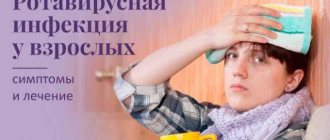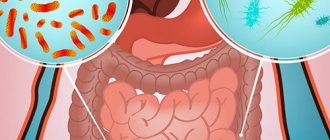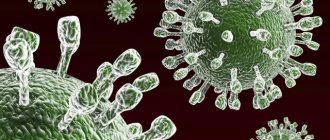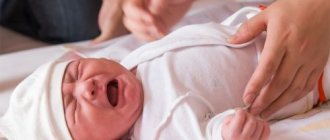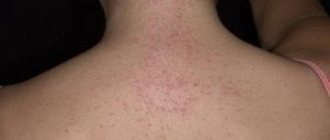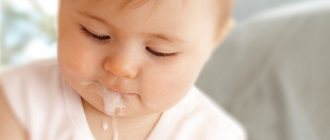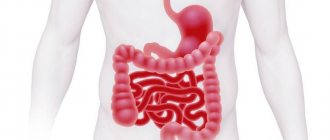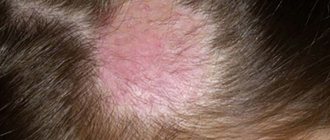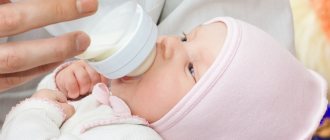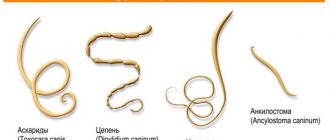Basic treatments for rotavirus
Rotaviruses are intracellular parasites that infect the cells of the mucous membrane of the human small intestine.
Hence the popular name for rotavirus “stomach flu”. 100% of children from 6 months to 5 years are susceptible to infection. There are two ways to expel rotavirus from a cell: destroy the cell (which is unacceptable in our case) or activate cellular defense mechanisms. Medicines for rotavirus infection act in several directions:
- alleviate the symptoms of rotavirus - high fever, vomiting, diarrhea, headache, cough, runny nose;
- restore loss of moisture and electrolytes;
- normalize intestinal microflora;
- stabilize the immune response;
- eliminate the consequences of the disease.
The doctor makes prescriptions and monitors the dynamics of the patient’s condition. The treatment is effective and does not cause harm to the patient with an intestinal infection. Sometimes a live vaccine is used.
It can be taken orally, in the form of rectal suppositories, or nasal drops. They are prescribed to patients with weakened immune systems.
It is recommended to take inexpensive drugs containing interferon and other antiviral components:
- "Viferon".
- "Arbidol".
- "Tsitovir".
- "Kipferon".
- "Anaferon", "Ergoferon".
- "Genferon."
"Viferon" for rotavirus infection is used to make treatment effective in children. The medicinal substance against rotavirus infection is synthesized on the basis of interferon and enriched with vitamins C and E. For young children - suppositories with “Viferon”.
The effectiveness of the drug in the treatment of rotavirus is based on the ability to influence the cell membranes of the structural elements of the human body.
It affects the affected cells of the intestinal epithelium, promotes their recovery, increases the resistance of the cell membranes of the intestinal epithelium against rotavirus infection.
The drug has immunomodulatory activity and is effective against E. coli. Taking it allows you to stimulate the production of nonspecific antibodies.
Treatment with Arbidol
Prescribed for treatment against rotavirus. When Arbidol is prescribed in parallel with the main pathogenetic treatment, the symptoms are less intense. Treatment for rotavirus infection is faster.
Treatment with Tsitovir
Treatment for intestinal infection is similar to the use of Viferon. Recovery occurs faster, symptoms are less intense. Rotavirus has a less intense effect on the intestinal walls.
These antiviral drugs are among the most commonly used. Pediatricians recommend Amiksin or Groprinosin - the best remedy for preventing the disease and reducing the intensity of the clinic with stomach flu. This is an excellent preventative drug
Age restrictions
Manufacturers recommend a complex immune preparation for infants from 1 month. There is evidence that in practice the drug can also be prescribed for newborns, but in exceptional cases when the possible harm does not exceed the expected benefit. The decision on appropriateness is made by a qualified physician.
For older children, the drug should also be prescribed by a doctor, since uncontrolled use of immunostimulants can be harmful and the child’s own immunity will become more “lazy.”
Features of rotavirus
With rotavirus infection, symptoms of a cold are observed in combination with a clinic of intestinal infection. The disease is called stomach or intestinal flu.
About 10 strains of rotavirus have been identified. Most of it poses a threat to human health.
Young children are susceptible to the disease. The disease is more complicated - the immune system is weaker than that of an adult.
Severe syndrome – dehydration. It is necessary to take medications for rehydration (Regidron), consult a specialist on how to take Regidron for children with rotavirus infection.
In adults, clinical manifestations are weaker. People do not attach any importance to the disease, they carry it and infect others. In adults, the disease occurs without clinical manifestations.
Routes of infection:
- When eating contaminated food, drinking contaminated water.
- In case of household contact with patients with rotavirus infection or carriers.
- When using common household items.
Viral activity is seasonal and occurs in the autumn-winter period. A person’s immunity decreases and becomes susceptible to disease. Re-infection with stomach flu is likely in young children. Often occurs when a child visits a preschool institution. When the disease recurs, the body's resistance is greater and the clinical manifestations are not intense. The resistance of an adult body is higher.
In the acute period of the disease:
- Increase in general body temperature.
- In the first days, signs of an acute respiratory infection are cough and runny nose, headache, sore throat.
- Intestinal symptoms develop - diarrhea, vomiting, abdominal pain.
Reasons for appearance
In everyday life, rotavirus is often called “the disease of dirty hands” and this is partly true. Transmission of the virus occurs mainly through contact. The fecal-oral route of spread of pathogens indicates that after visiting the toilet, from unwashed hands, the virus spread to household items: dishes, toys, door handles and any surfaces that the carrier touched.
Rotavirus in a child, the treatment of which can take only a few days, becomes infectious from the first days. The duration of the dangerous period for others is 10 days. In some cases, the child remains a virus carrier and can be contagious for up to 60 days.
Infection can occur through tap water, food products, most often dairy products. There is evidence of airborne transmission of infection, but still it is the contact route that remains the source of mass infection during epidemiological outbreaks.
For children under 1 year of age, provided they receive full breast milk, the likelihood of infection is low, and the developmental prognosis for infection is most favorable. The mother's immune system provides the baby with the necessary antibodies to fight the pathogen.
From 1 to 3 years of age, the body’s defenses must learn to fight rotavirus on their own. It is at this age that the incidence increases, and the contagiousness of the virus becomes very high.
The disease spreads most quickly through close contact with a sick person, in kindergartens, at group events, in swimming pools, on river and sea beaches. According to official statistics, 98% of people experience infection before the age of 5.
Symptomatic treatment
The period from the moment of infection to the first clinic is 2-3 days. Signs of rotavirus infection begin with vomiting, high fever, and then watery diarrhea. Medicines for rotavirus infection in children and adults reduce fever, prevent intoxication, eliminate dehydration, and restore electrolyte balance.
The first days of illness are manifested by an increase in temperature. High body temperature is a protective response to the introduction of the virus, one of the manifestations of the immune response. Antipyretics are used at temperatures above 38°C.
Ibuprofen is used for fever and pain due to rotavirus infection in children. The drug under the trade names Nurofen, Ibufen, Ibalgin is available in forms convenient for children - tablets, capsules, suspension, syrup, oral solution.
For children, Ibuprofen suspension is prescribed three times a day after meals:
- from 3 months to one year – 10 mg per kg;
- from one to three years – 50 mg per kg;
- from four to six years – 100 mg per kg;
- from seven to nine years – 150 mg per kg;
- from ten to twelve – 200 mg per kg.
Used to treat pain and fever due to rotavirus, used for no more than 2 days in a row. The medicine helps relieve fever and does not affect the source of the disease.
Adults can take regular Paracetamol to relieve fever and pain from rotavirus. The tablet is taken an hour after a meal with water, but not more than 4 tablets per day. The product only relieves fever, does not fight the virus, and is not used for more than 3-5 days in a row. For children, Paracetamol is produced as part of Panadol, Efferalgan, Kalpol. There are rectal suppositories with Paracetamol, they are used for severe vomiting.
Diarrhea remedies
Diarrhea is a serious problem with rotavirus infection in adults and children. Diarrhea leads to the development of dehydration, especially when combined with fever and vomiting. You can stop diarrhea due to rotavirus disease in a child with Smecta. A bag of powder is diluted in 50 ml of boiled warm water and drunk between feedings.
Adults are recommended to take astringent, strengthening decoctions of oak bark, pomegranate peels, St. John's wort or sage, and bird cherry fruits. After each loose stool, drink 100 ml of a warm, weak herbal decoction. Decoction recipe: pour 300 ml of boiling water over a teaspoon of dry raw material, leave for 30 minutes under a towel, strain.
The most dangerous complication of rotavirus is dehydration. Restoring the body's water balance after rotavirus involves administering fluids in any way - orally, infusion. At home, it is acceptable to give the patient water, dried fruit compote, and weak tea. Treatment of electrolyte imbalance in intestinal flu is carried out with salt regidarants from the pharmacy - Regidron, Humana, Oralit.
Release form
The product is available in the form of a compressed lyophilized powder. Each glass bottle contains 300 mg of protein.
A liquid solution is prepared from the lyophilized powder by adding water. The prepared solution is taken orally. The very concept of “enteral administration”, which is in the name of the CIP, implies the introduction of the active substance from the outside. Natural immunoglobulins are produced only inside the human body. The immunoglobulins obtained with the solution come from the outside, that is, enterally. Neither tablets, nor suppositories, nor capsules, nor ointments with this name are produced. There are no other forms of the drug in nature.
Preparations for the prevention of rotavirus infection
In treatment, the main task is to eliminate signs of dehydration and symptomatic therapy. Antiviral drugs can increase the body's nonspecific immune response and speed up recovery.
During the incubation period, the virus enters the body and spreads throughout it. The phase lasts 1-5 days. Nonspecific antiviral therapy increases the body's immune defense and prevents the infection from spreading.
The acute stage is accompanied by severe symptoms and leads to the development of complications in young children and weakened adults.
There is no point in taking antibiotics (Ciprofloxacin, Levofloxacin). Medicines are ineffective against viruses and can be prescribed when a secondary bacterial infection occurs.
Antibacterial drugs negatively affect the normal intestinal microflora, promote the development of dysbiosis, suppressing the growth of normal microflora.
If a secondary bacterial infection occurs, give the child medications with a local effect on the intestines. "Biseptol" or "Eterofuril". The substances kill pathogenic flora and do not cause dysbacteriosis.
Non-pathogenic types of intestinal microflora are not affected. It is necessary to do a bacteriological culture to determine the pathogen in the smear. Do not give Enterofuril tablets or capsules to children until they reach the age of seven. For young children, children's syrup is prescribed.
To alleviate the condition of intestinal viral diseases, intestinal sorbents and dehydration drugs are taken. "Smecta" in children removes viruses and their toxins from the intestines and promotes recovery. In adults, drugs such as Enterosgel and activated carbon.
If a secondary infection occurs, he recommends taking Levomycetin, doing a bacteriological culture and determining which drugs the pathogenic microflora of the gastrointestinal tract is sensitive to. Children with a tendency to intestinal pathology are given suppositories with chlorhexidine called Hexicon.
It is recommended to take "Regidron" for adults and children. Antiemetics are prescribed for symptomatic purposes against vomiting. For nausea you can use Motilium or Cerucal. In case of intense vomiting in a child, they are administered parenterally. Treatment with folk remedies for rotavirus will not help. If the child has a fever, give the child an antipyretic. If diarrhea occurs, use inexpensive drugs - Loperamide or Imodium.
Before deciding which medications to take, consult with specialists. They will help determine whether certain medications are needed to treat rotavirus infection and how many days to take them to achieve recovery.
Antiviral drugs for rotavirus infection are generously presented in our pharmacies, for every taste and budget.
After a diagnosis of rotavirus infection, an extensive list of antiviral drugs is recommended:
- Anaferon;
- Arbidol;
- Aflubin;
- Ingavirin;
- Viferon;
- Ergoferon;
- Cycloferon;
- Kagocel;
- Kipferon.
The principle of action of antiviral drugs is based on the activation of protective protein systems to suppress the expansion of viruses. The instructions for Kipferon suppositories, for example, say that they have antiviral properties and fight chlamydia and salmonellosis. However, the immunomodulatory effect of this group of drugs has not been proven.
As prescribed by a doctor, a complex immunoglobulin preparation or CIP is used. It is used for acute intestinal rotavirus infections, dysbacteriosis, weakened immunity in premature infants, the elderly, and acquired immunodeficiency. The instrument is a bottle of dry immunoglobulin powder. The powder is diluted with water and taken orally half an hour before meals. Use instrumentation 1-2 times a day for a week.
Rotavirus or intestinal flu is a common disease among children, but can also occur in adults. When the virus enters the body, it affects the small intestine and stomach.
The disease begins with cold symptoms, and later manifests itself with diarrhea and vomiting. How to treat rotavirus infection?
Rotavirus infection is an acute infectious disease, the symptoms of which are general intoxication and damage to the gastrointestinal tract
The causative agent of the disease is rotavirus, which is covered with a three-layer shell and has the shape of a wheel. Upon penetration, the virus is located in the small intestine and begins to actively multiply. By exerting a pathogenic effect, microbes destroy mature cells. As a result, the process of breakdown and absorption of enzymes is disrupted.
If hygiene standards are not observed, infection with the virus can occur through consumption of dairy products. Contaminated food can also cause rotavirus infection.
In rare cases, infection occurs through airborne droplets.
Most often, the incidence occurs in the autumn-winter period. The intestinal flu virus can be in the refrigerator, since low temperatures do not kill it. In addition, microbes are resistant to chlorine, ultrasound, formaldehyde, and ether. They die only by prolonged boiling or the use of alkali and acids.
Immunity does not protect against re-infection, as immunity to a specific type of virus is developed. With possible infection by the same pathogen, the disease progresses more easily.
Abdominal pain, vomiting, high fever and general weakness are signs of rotavirus infection
From the moment the infection gets inside until the first signs appear, 1-2 days pass. The acute period lasts about 4 days, and in general the disease lasts about 2 weeks.
The following symptoms are observed with rotavirus infection:
- Increased body temperature.
- Constant vomiting
- Watery stools with an unpleasant sour odor.
- Abdominal pain.
- White coating on the tongue.
- Redness of the throat.
- A sore throat.
- Dry weak cough.
- Malaise and weakness.
- Decreased appetite.
Analogs
KIP belongs to the pharmacological group “Immunoglobulins”. This is a fairly large group, with more than 320 drugs. But there are only 12 active ingredients in these drugs. It is on their basis that all the products included in the pharmaceutical group are created. It will not be difficult to select an analogue of the instrumentation; the choice, as you can see, is large.
For example, “Gabriglobin”, “Gabriglobin IgG”, “Imbioglobulin”, “Pentaglobin”, “Immunovenin” may be recommended. Among foreign-made drugs, analogues more or less close to CIP will be “Gamunex”, “Intraglobin”, “Oktagam”.
Kipferon suppositories are often recommended for children, but they are not immunoglobulins in their pure form, being a combined preparation of immunoglobulins with interferons. In terms of pharmacological action, the drugs demonstrate the properties of analogues, and therefore KIP may well be replaced by Kipferon rectal suppositories.
Antibiotics for rotavirus
Rotavirus, as a causative agent of an intestinal disease, was discovered in the 70s of the 20th century by Australian scientists. Until this time, antibacterial drugs were used for this pathology, as they were confident in the microbial nature of the disease. Therefore, “old-school” specialists and their students still prescribe antimicrobial agents for rotavirus.
Antibiotics are not currently used for rotavirus infection. For the treatment of viral diseases, antibiotics and other antibacterial medications (nitrofurans, sulfonamides) are absolutely useless. Antibiotics for rotavirus infection in children are used in the event of a bacterial complication.
Indications for antibiotics:
- blood in loose stools;
- diarrhea for more than 2 weeks;
- detection of Giardia in feces.
Special Recommendations
Before using the instrumentation, you need to make sure that the packaging is not damaged.
If there are signs of a lack of tightness, use should be discarded. You also need to check the manufacturing date and expiration date. If a child develops an allergy, it is necessary to provide the doctor with information about the number and series of the drug, they are indicated on the packaging.
The cost of the complex immunoglobulin preparation KIP is quite high.
A package containing 5 bottles with single doses costs from 750 to 970 rubles in Russian pharmacies as of August 2020. The drug can be purchased individually - 1 bottle costs on average 170-200 rubles.
Effective medicines for rotavirus: list, composition and reviews
Doctors also call rotavirus infection intestinal flu. This is a rather dangerous disease that most often occurs in children. Adults tolerate pathology more easily due to their developed immunity.
Intestinal flu manifests itself with diarrhea and vomiting. In addition to these symptoms, other signs may be present: nausea, loss of appetite, fever, headache, runny nose, and so on.
Each person's body reacts to the pathogen differently.
In order not to find yourself in a dangerous situation, you need to know what medications exist for rotavirus. However, you should not self-medicate. If signs of infection appear, you should consult a doctor. It is especially dangerous to carry out therapy on your own in young children.
You won’t have to take medications if you remember about this disease and regularly prevent it. You need to know the sources of infection. The majority of viral intestinal infections are transmitted through dirty hands.
Items and clothing, personal hygiene products - everything can retain intestinal flu on its surface. If an infected person holds on to a handrail on a bus or uses a shopping cart in a supermarket, he leaves behind a colossal amount of germs that can infect more than one person.
The infection can be transmitted through toys, food, and water.
To keep your child safe, teach him to wash his hands all the time and use only personal hygiene products. Immediately upon returning from the street, the baby should use antibacterial soap.
But these drugs will not guarantee protection if antiseptic rules are not followed.
What medicine to use for rotavirus if infected? A specialist should describe the treatment regimen and prescribe certain medications. Show your baby to a pediatrician or infectious disease specialist. You may have to undergo some tests. The list of prescribed drugs may vary. Doctors usually use the following medications:
- symptomatic remedies (for nausea, vomiting and diarrhea);
- cleansing agents (sorbents and enterosorbents);
- improving well-being (antipyretic and painkillers, antispasmodics);
- replenishing fluid deficiency;
- antibiotics and antivirals;
- immunomodulators;
- restoring intestinal microflora.
For individual indications, drugs of other directions may be prescribed. Let's look at what medications are used for rotavirus.
Anti-diarrhea medications
Not a single intestinal flu goes away without digestive upset. Diarrhea is a constant companion of infection. Diarrhea is frequent loose stools accompanied by flatulence and abdominal pain. Often, stool becomes greenish in color and has a foamy consistency. What medications for rotavirus are effective in this case?
Loperamide-based drugs will help you against diarrhea. Their trade names are Loperamide Stada, Imodium, Loperamide, Lopedium, Superilol. All of them are contraindicated for children under two years of age.
Some formulations are not prescribed for children under 6 years of age. It is also prohibited to take these medications in case of severe liver failure and suspected intestinal obstruction.
Diphenoxylate-based drugs are prescribed less frequently.
The second most popular sign of intestinal infection is nausea and vomiting. They do not occur to everyone. Young children are most susceptible to such manifestations. In adults, this symptomatology is found quite rarely. If a child vomits from every intake of liquid, then hospital treatment is necessary. For rare attacks, outpatient therapy is possible.
There are different medications for rotavirus that combat vomiting. The doctor may prescribe domperidone-based medications. These are drugs such as Motilium, Motilak, Passazhiks, Domstal and others. They are available in the form of suspensions and tablets. The latter form, due to its high dosage, is not prescribed to children under 5 years of age.
Doctors also use drugs based on metoclopramide. These are medications such as Cerucal, Reglan, Metamol, Perinorm. It is prohibited to use these drugs during pregnancy and lactation, in case of intestinal obstruction and bleeding in this area.
The next medicine for rotavirus that can be prescribed by a doctor is rehydration solution. Dehydration occurs during diarrhea and frequent vomiting.
This condition is dangerous for an adult, and can even lead to death in a child. When the body is dehydrated, the blood thickens and there is a risk of blood clots. Death occurs when fluid deficiency is more than 20%.
The following medications are used to restore normal levels of electrolytes, salt and water in the body:
- "Sodium bicarbonate" (used for infectious dehydration).
- "Sodium chloride" (prescribed during acute diarrhea).
- “Sodium citrate” (recommended for blood thickening).
In the pharmacy chain you can purchase a complex medicine: “Regidron”, “Citraglucosolan”, “Hydrovit Forte”. They contain sodium chloride, sodium citrate, potassium chloride and dextrose anhydrous. These medications are usually produced in powder. The bulk substance must be diluted before use and consumed in small portions at short intervals.
During an infection, a rotavirus cleansing medicine must be used. Sorbents have different release forms. You can purchase tablets, powders, gels, pastes or solutions. Consult your doctor and choose the most suitable remedy. The most popular drugs used for rotavirus are Polyphepan, Enterosgel, Polysorb and Activated Carbon.
Please note that the medications described must be taken separately from other medications. All sorbents remove toxins and poisons, bacteria and viruses from the body. At the same time, they eliminate the therapeutic effect of the medications taken. Such formulations are used regardless of age and concomitant diseases. They are not absorbed into the bloodstream and are excreted in their original form.
What medicine is used for rotavirus in children? When pathology appears in children, doctors recommend the use of antiviral compounds. The child's body is weak enough to cope with the problem on its own. Immunomodulatory agents will help restore the body's resistance and cope with viruses.
The most popular medications are:
- "Anaferon" (affinity purified antibodies to interferon).
- "Ergoferon" (antibodies to interferon gamma).
- "Tsitovir" (thymogen, benzazole, ascorbic acid) and so on.
The same list includes rectal suppositories based on interferon: “Kipferon”, “Genferon”, “Viferon”. Some drugs can only be used after a year. Therefore, it is advisable to study the instructions before use.
What medications are used for rotavirus at sea? An infection acquired from a public body of water is often bacterial in nature. This disease requires the use of antiseptics and antimicrobial compounds. These include “Ersefuril”, “Stopdiar”, “Enterofuril” and others. They contain the main component nifuroxazide.
This active substance works exclusively in the intestines. It is not absorbed into the blood, so it can be prescribed to children in the first year of life. The medication does not have a negative effect and does not cause adverse reactions. You need to take the medicine for no more than 7, but not less than 5 days.
Currently, all these drugs are divided into probiotics and prebiotics. What to choose in case of rotavirus? After all, most often the doctor gives the patient freedom in this matter. First you need to figure out what these and other drugs are for.
Probiotics are complex products containing beneficial bacteria (lacto-, bifido-, non-pathogenic colonies of Escherichia coli and others). Prebiotics are medications that feed existing beneficial bacteria. Such drugs also help improve digestion and normalize the balance of bacteria in the body.
The medicine against rotavirus must be a probiotic. During illness, diarrhea removes all good substances from the intestines; sorbents eliminate harmful microorganisms along with beneficial ones. The antibiotics used also negatively affect the microflora.
Such medications include Linex, Acipol, Bifiform, Imoflora, Primadofilus and many others.
Reviews
Patients have different opinions about the course of the disease. For some, the pathology is mild and does not require any therapy. It is enough just to adjust your diet and stick to the diet for several days.
Other people have a very difficult time with rotavirus infection. They experience all the “delights” of the disease. In severe cases, treatment should be carried out in a hospital. For frequent vomiting, doctors recommend taking medications not orally, but through a tube.
Rehydration therapy is also carried out intravenously or by drip.
Reviews from people who have suffered pathology say that when using prescribed medications it becomes much easier. Therefore, at the very beginning of the disease you need to consult a doctor. Doctors confirm that as the disease progresses, the human body weakens more and more.
Often, patients also have to use antipyretic formulations based on ibuprofen (Nurofen) or paracetamol (Panadol).
Finally
Treatment for rotavirus infection differs from treatment for colds. Often at the very beginning of the disease there are symptoms such as redness of the throat and runny nose.
Therefore, patients confuse this ailment with the flu or a respiratory disease. Incorrect self-medication in this situation only aggravates the state of health and delays the moment of recovery.
Contact a doctor and don’t get sick!
Contraindications
Immunoglobulin for a child’s body is a protein produced in a foreign body, that is, foreign. If a child suffers from an increased tendency to various types of allergies, then his body may inadequately perceive a foreign protein.
Therefore, children who have at least once experienced a negative reaction to foreign proteins are not recommended to be given CIP. The most dangerous are a history of angioedema and anaphylactic shock.
Possible intolerance to glycine, which is included in the lyophilisate as an additional (auxiliary) substance, is also taken into account. The drug has no other contraindications.
Restoring digestive function
Having survived the acute period of rotavirus introduction, they begin to restore the intestinal microflora.
For rotavirus, follow a diet for at least 2 weeks. The peculiarity of rotavirus is the inhibition of the enzyme that breaks down milk sugar. Therefore, exclude all dairy products from the diet, otherwise diarrhea will last for a long time. For infants, the pediatrician may prescribe special lactose-free formulas. The patient is fed frequently and in small portions.
Capsules with dry live strains of beneficial bifidobacteria and lactobacilli normalize the intestinal microflora. The gelatin capsule protects microorganisms from the aggressive environment of the stomach when swallowed. In the moist, favorable environment of the intestine, bacteria revive and colonize the colon, restoring the microbial community.
Probiotics:
- Bifidumbacterin;
- Bifiform;
- Probifor;
- Linux;
- Enterol;
- Eubicor;
- Acipol;
- Baktisubtil.
Analogs of probiotics differ in the species composition of microbes. The optimal drug is selected after examining stool for dysbacteriosis. The analysis will show which beneficial bacteria the body lacks.
When is it contraindicated?
The drug is not prescribed if hypersensitivity to any of its components is detected. Since both forms of Enterofuril contain sucrose, the medication should also not be used in children with hereditary diseases in which sugar metabolism is impaired, for example, in the absence of sucrase or fructose intolerance. There are no other contraindications for the use of Enterofuril.
Medicines for children under 1 year of age against vomiting
An antiemetic for children must be appropriate for the child's age, otherwise, instead of benefit, the child will be harmed. Some types of anti-nausea and vomiting medications are intended strictly for adults.
| Drug name | Release form | Peculiarities |
| But-Spasm | Produced in several forms: tablets, syrup, injection | Relieves spasms of smooth muscles of the digestive tract, stops vomiting. The recommended form of medicine for children is in liquid form. |
| Domperidone | Available in the form of candles, which is ideal for children of the first year of life. | Quickly eliminates symptoms of indigestion, normalizes the functioning of the gastrointestinal tract |
